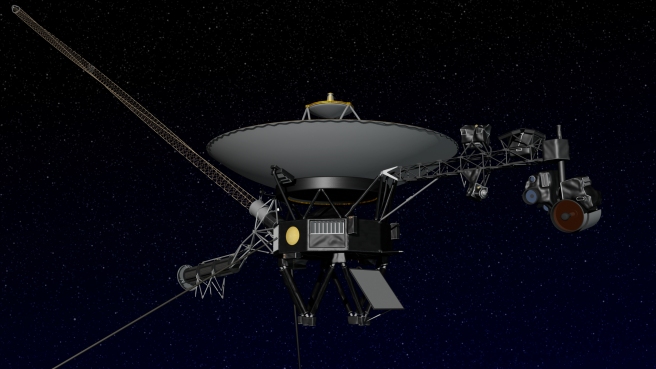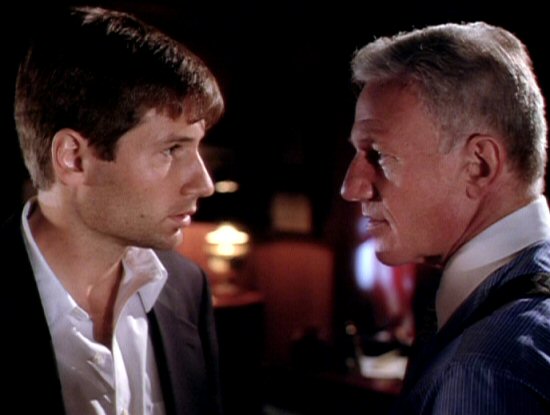“What am I looking for?”
“Contact?”
If you’re a fan of The X-Files, there’s every chance you’re also a fan of Star Trek, so I’m guessing you’ve seen The Motion Picture? In that 1979 movie, the USS Enterprise heads out to protect Earth from ‘V’Ger’, a travelling space entity made up of some kind of alien consciousness, only for the crew to discover ‘V’Ger’ is, in fact, a fictional sixth version of the space probe Voyager, launched from the Kennedy Space Flight Center, Florida, in 1977 in order to carry the sum total of accumulated human knowledge on biology, physics, art, literature and more across the cosmos so should an extra-terrestrial civilisation intercept it, they would understand a base primer of the human race and its condition.
That same probe, or at least a closely related variant, is the one discussed by Special Agent Fox Mulder as The X-Files begins its second season with ‘Little Green Men’, and like Star Trek: The Motion Picture, weaves in real life science fact with science fiction.

‘V’Ger’ as it became known, its consciousness channelled through the seized mind of beguiling Lieutenant Ilia, had evolved to consider human life it’s ‘creator’ and despite appearing purely alien to even the advanced Starfleet of the 23rd century given its centuries of experience in the far reaches of the cosmos, the artificial intelligence ‘V’Ger’ became was decidedly *human* in its childlike naivete about emotion and understanding – it was simply a child who had come home to seek its parent. A similar probe to the one Mulder describes in the opening narration, possessed of human experience, had absorbed and mutated its understanding of the human species into its own God-like, creation myth story. In that tale, ‘V’Ger’ was ultimately set free perhaps by the ultimate expression of humanity.
Love.
Let us consider Voyager from the prism of The X-Files, a very different show to Star Trek in its world-view yet one that’s as every bit esoteric and philosophical in its more nihilistic, paranoid and self-destructive view of humanity’s near future.

‘Little Green Men’ is all about contact, not just with extra-terrestrial life, but for Mulder in his ever-continuing quest to find his missing sister Samantha. The same aliens who appear to respond to the Voyager probe, who appear to have intercepted humanity’s one single expression out into the stars, are inextricably linked in Mulder’s mind to the same alien force who robbed him of his sibling and in many senses his childhood. These could also well be the alien force who collaborated with the Syndicate conspirators for decades to bring on a viral apocalypse, but are they? If Voyager was discovered by a sentient, other-worldly species hundreds or thousands of light years from Earth, what is their expression in return? The Motion Picture suggests the love of God, in its own quasi-spiritual way. The X-Files suggests, with ‘Little Green Men’, an affirmation of truth.
For if we are to believe the Voyager probe, with its strains of Bach or Vitruvian Men or complex DNA helixes, depict the beautiful apex of our society, how could any alien civilisation who came across it not consider the Earth, as Senator Richard Matheson suggests in the episode, not to be a “wondrous place”? Why would they not come here to discover, to learn, to embrace?

The 60’s was a decade fuelled by hope, driven by capitalist buoyancy following decades of war and strife. The 90’s, by the time The X-Files arrived, had began to see that bubble burst. The writers of that show, much like their audience, no longer imagined a future when Voyager might return of humanity standing tall in a galactic Federation, exploring the stars and the mysteries of the universe. Rather we imagined a world fuelled by secrets and lies, inequality and power, a world where the truth was far more elusive than love. We wanted to believe. We wanted to listen. “The tools had been taken away,” as Mulder stated in his opening narration, with the Clinton administration giving to projects such as SETI (Search for Extra-Terrestrial Intelligence) with one hand, and the other taking away. Voyager, launched as it was ironically in the post-Watergate era of melancholic disillusionment in the American Dream, felt like the last breath of an attempt to find truth, to explore those extreme possibilities, and to reach out into the cosmos with an expression of peace and friendship. If we weren’t alone, ‘Little Green Men’ inhabits a world where perhaps we’re better off that way.
Come the end of the episode, Mulder doesn’t find his sister, or his truth, which in many respects are one and the same thing. What he does find is affirmation of his quest, of his reason to continue the search. If in The Motion Picture, Voyager finds us, in ‘Little Green Men’, it’s Mulder who finds Voyager, and it gives him not love, but an emotion equally as powerful.
Hope.

Tony is a writer and podcaster who created The X-Cast. You can find him on Twitter @Mr_AJ_Black
You can find The X-Cast episode discussing ‘Little Green Men’ on Libsyn, iTunes or your podcast app of choice.


